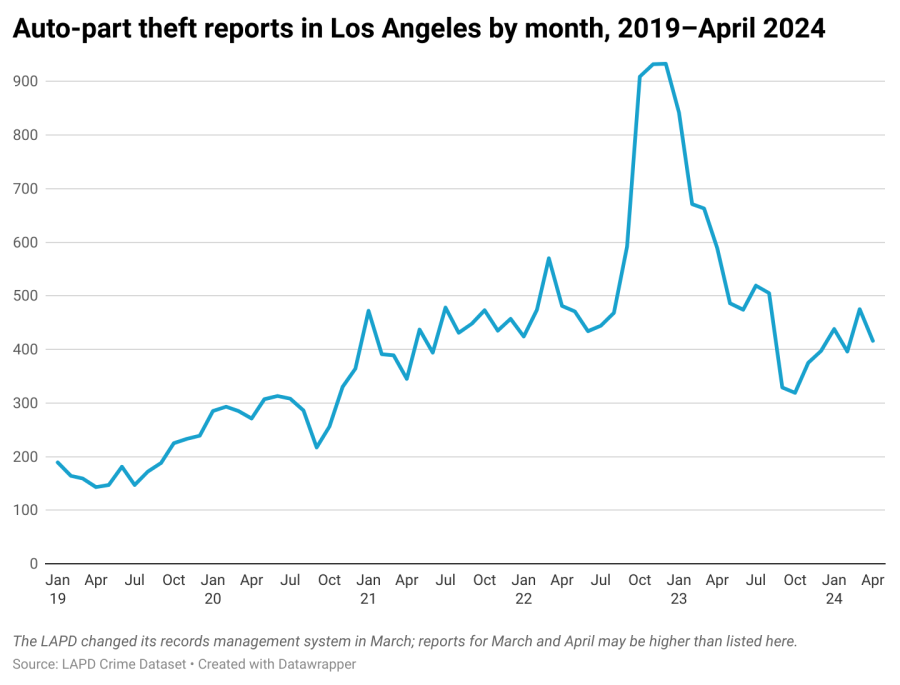Despite recent headlines surrounding violent and threatening encounters with catalytic converter thieves, data from the Los Angeles Police Department shows that the crimes have dropped significantly over the past two years.
The data, which was analyzed and summarized by independent news organization Crosstown LA, shows that catalytic converter thefts peaked in late 2022 but have been on the decline since.
LAPD Interim Chief Dominic Choi said in a recent Los Angeles Police Commission meeting there were 2,313 catalytic converter thefts citywide through from Jan. 1 to June 4, while there were 3,857 thefts over that same time frame last year — a roughly 45% decrease year over year.
In late 2019 and early 2020, when the problem was at its worst, police received as many as 900 reports of stolen catalytic converters per month.
“For much of the last year there have been in the vicinity of 350–500 reports each month,” Crosstown wrote.

The dropoff, according to Crosstown, can likely be attributed to multiple factors, including an onus by law enforcement to prevent the crimes and a set of new laws that are making the thefts less lucrative.
Catalytic converters are regular targets for thieves because they can be cut from the undercarriage of a car with relative ease and sold to recyclers for anywhere from $25 to $300 for a standard vehicle and up to $1,400 for hybrid vehicles, according to the vehicle data company Carfax.
The critical piece of automobile tech is used to filter out harmful byproducts from your car’s exhaust. They use precious metals like platinum, palladium and rhodium to accomplish this, and those metals can sell for hundreds to thousands of dollars per ounce.
But Crosstown suggests that a “flurry of news stories” has prompted law enforcement agencies to devote more focus on the crimes and new legislation now requires recyclers and scrap buyers to have “documentation showing that any purchased catalytic converter was not stolen or illegally removed.”
Other strategies involve specific campaigns to make the crucial vehicle part more easily identifiable with its proper owner.
“The LAPD and other law enforcement agencies host occasional events in which a vehicle identification number can be etched on the device.”
The findings from Crosstown are consistent with reports from other sources, including some insurance providers that show repair requests to replace catalytic converters also began going down in 2023 — the first decline seen since 2019.
However, Carfax, known for tracking repairs and accidents on vehicles across the country, cautioned that the problem might actually be significantly underreported, in part because drivers might not file insurance claims to get the part replaced.
But local data at least shows that something has changed in recent years, Crosstown says.
Despite high-profile crimes, including the killing of actor Johnny Wactor who confronted a group of thieves, as well as a homeowner seemingly receiving a warning from another, the crimes aren’t as prevalent as many might think.
To read the full report from Crosstown LA, click here.






















